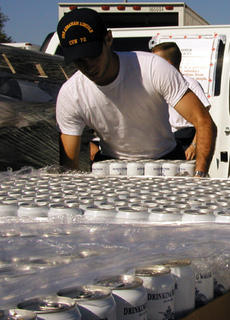About Donating Goods to the Red Cross for Areas Impacted by Hurricane Katrina

Wednesday, August 31, 2005 — When a disaster of the magnitude of Hurricane Katrina strikes and the news broadcasts images of broken, battered and destroyed homes, it is natural for the public to be eager to help their neighbors – whether they’re across town or across the country. Often, seeing that they have lost everything, people are eager to donate food, clothing or other goods to meet the needs of storm victims and help the affected families begin to replace what they have lost.
Anheuser-Busch donated more than six million cans of water to the American Red Cross and other relief agencies to aid victims and relief workers during the 2004 Atlantic hurricanes. U.S. Navy personnel provided invaluable assistance to the Hurricane Ivan relief operation last year by loading critically needed water donated by Anheuser-Busch onto Red Cross ERVs at the Pensacola Civic Center distribution site, Fla., September 2004. (Photo Credit: Dave Murray/American Red Cross/File)
"While that generous spirit is truly appreciated, the American Red Cross cannot accept this type of donation for the victims it is serving," said Amanda Lepof, an American Red Cross In-Kind Officer.
Today, the Red Cross is operating more than 250 shelters across seven states, providing a safe haven for nearly 42,000 evacuees – many who have been left homeless by Katrina. The first priority is meeting the urgent, critical needs of those people, which include providing emergency shelter, food and water.
"In-kind donations are best when they come from companies that can provide new items in a quantity that meets the mass care needs of victims – for example, Anheuser-Busch is again donating canned water for hurricane victims and response workers," said Lepof. "Unsolicited, spontaneous donations of goods and services from individuals and community groups, although well intentioned, have hidden costs and pose a number of complications for initial relief efforts."
For these reasons, the Red Cross is unable to accept any large collections of items, such as used clothing, hygiene items, furniture, toys, blankets, and canned goods. Nor is it able to accept small, individual donations of these items.
Why does the Red Cross discourage donations of collected goods and individual items for disaster relief?
Collections of items require valuable and scarce resources such as time, money, and personnel to sort, clean, and distribute them, which come at the expense of the emergency activities relief workers are attempting to perform. The Red Cross has neither the resources, nor the logistical set-up, to properly handle these types of donations, and therefore cannot accept them.
In addition, because the organization has no way of knowing what spontaneous individual donations or unsolicited collections of items will consist of, and therefore cannot ensure there will be enough of a particular item to distribute it equitably, or if the donated products will even be appropriate for the relief effort.
Shipping donated goods is also costly and particularly difficult in the aftermath of a disaster, as roads are often damaged or impassable, and easily clogged with shipments of non-priority items. The Red Cross makes every attempt to procure items locally to save money by minimizing transportation and storage costs.
“We don’t want to discourage people who want to help,” said Lepof. “But, making a financial gift to support the relief operations really is the best way for people to help after a disaster like this.”
Monetary financial contributions enable the Red Cross to support the greatest needs in the most efficient manner. Cash can be used to purchase items in adjacent, staging areas and eliminate the added costs involved in transporting goods.
Where can donations of collected goods and individual items be most effective?
Individual donations of goods and collections of items are put to their best possible use, and have the greatest impact economically, when they are donated to local charitable organizations within the local community. Donating locally eliminates transportation costs and ensures disaster workers are not overwhelmed with sorting unsolicited donations and are free to perform priority relief activities. Because these local agencies are not operating in the crisis environment that characterizes disaster relief, the charity will have the time sort, clean, and repair goods and identify how and where they can be most beneficial.
Guidelines for Effective Giving in Support of Disaster Relief
Before beginning any sort of collection drive, it is important to first call a charitable agency and confirm that there is a need for the donation and that they are able to accept it. Several organizations active in disaster relief have published guidelines that offer practical advice on steps that should be taken prior to starting a collection drive or purchasing items to donate to disaster relief.
All American Red Cross disaster assistance is free, made possible by voluntary donations of time and money from the American people. You can help the victims of this disaster and thousands of other disasters across the country each year by making a financial gift to the American Red Cross Disaster Relief Fund, which enables the Red Cross to provide shelter, food, counseling and other assistance to those in need. Call 1-800-HELP NOW or 1-800-257-7575 (Spanish). Contributions to the Disaster Relief Fund may be sent to your local American Red Cross chapter or to the American Red Cross, P. O. Box 37243, Washington, DC 20013. Internet users can make a secure online contribution by visiting

0 Comments:
Post a Comment
<< Home